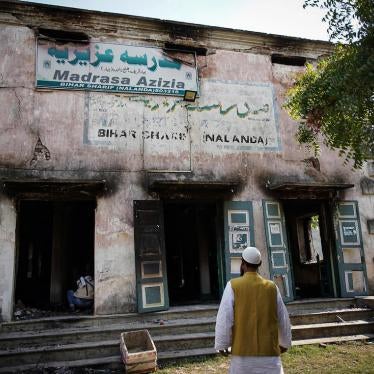Prime Minister Justin Trudeau will travel to Japan on May 19 for the Summit of the Group of Seven (G7), an annual gathering of some of the world’s wealthiest economies. This year, meeting in Hiroshima, G7 member states will be joined by the leader of a country that is undergoing a serious regression in human rights and constitutional protections. A country that continues to be a major blind spot for the Trudeau government: India.
Prime Minister Narendra Modi will be attending the Summit as the head of state of what is often hailed as the world’s largest democracy. The G7 clearly views India as a strategic diplomatic and trade partner, and a critical alternative to China. But is it a dependable partner?
Modi’s Bharatiya Janata Party (BJP)-led government has been responsible for India’s human rights crisis, marked by increasing attacks on religious minorities by Modi supporters, and the government’s tightening grip on civil society. The authorities have used draconian laws and politically motivated investigations to arrest and intimidate activists, journalists, opposition leaders, academics, peaceful protesters, and critics. The government has also shut down foreign funding for thousands of nongovernmental groups, particularly those that work on human rights or the rights of vulnerable communities.
India’s most prominent opposition leader, Rahul Gandhi, was sentenced to two years in prison in a politically motivated defamation case after he raised questions about the prime minister’s close relationship with a billionaire industrialist accused of massive corporate fraud. Leaders of other political parties have also been arrested or are facing politically motivated investigations by federal agencies.
The BJP government has repeatedly adopted laws and policies that systematically discriminate against minority Muslims and Christians. These laws, coupled with communal and divisive speeches by BJP leaders and its ideologically Hindu majoritarian affiliate groups, have normalized violence and encouraged threats, harassment, and attacks on minority religious communities.
Indian authorities are also using technology to curtail rights as part of their broadening crackdown on freedom of expression, association, and peaceful assembly. The government has imposed the largest number of internet shutdowns globally, which results in millions of people losing access to essential goods and services in an increasingly digitized world. It has adopted laws and policies effectively allowing greater governmental control over online content including to curb legitimate criticism, weaken encryption, and seriously undermine rights to privacy and freedom of expression and information online.
This alarming repression has also affected the Indian diaspora in Canada. In March 2023, Indian authorities ordered Twitter to block the accounts of several high-profile Canadians, making them inaccessible in India. This includes the accounts of Jagmeet Singh, the New Democratic Party leader; his brother, Gurratan Singh, a former member of the Ontario provincial parliament; and Rupi Kaur, a poet. These Canadians had expressed concerns over the Modi government’s severe crackdown in the northern Indian state of Punjab as the authorities searched for a separatist leader. The government had placed the entire state under a three-day internet blackout, affecting more than 27 million people, blocked the Twitter accounts of several journalists and activists in Punjab, and temporarily detained scores of people.
The crackdown in Punjab came just a month after the Indian authorities raided the BBC offices in India in apparent reprisal for a documentary critical of Modi.
The Canadian government should not be ignoring this serious backsliding in human rights in India. India is critical to Canada’s new Indo-Pacific Strategy and often lauded by Global Affairs Canada for the two countries’ “shared tradition of democracy and pluralism” and “common commitment to a rules-based international system.” But this is increasingly a fiction that makes it easier for Ottawa to avoid dealing with the sobering reality.
As Canada and other G7 governments look to India to help tackle global challenges and strengthen strategic and economic co-operation, they should learn from their mistakes with China that a powerful, abusive government does not make a reliable partner. After the Tiananmen Square massacre of pro-democracy protesters by Beijing in 1989, western businesses flocked to China and governments hoped a wealthier China would be a more rights-respecting country.
Since then, an even more powerful Chinese government has become a more repressive rights violator that increasingly threatens democracy and human rights globally. At the G7, Trudeau should publicly call on India to reverse course and uphold the rights of all Indians, irrespective of their caste, religion, ethnicity, or political belief.
When Canada announced its candidacy for the 2028-2030 term of the United Nations Human Rights Council earlier this month, the government affirmed its strong leadership in championing rights around the world. But an important prerequisite for meaningful and principled leadership is the ability to recognize the reality on the ground, however difficult, and consistently condemn abuses, even those committed by allies. Trudeau has an opportunity at the G7 to do exactly that.









